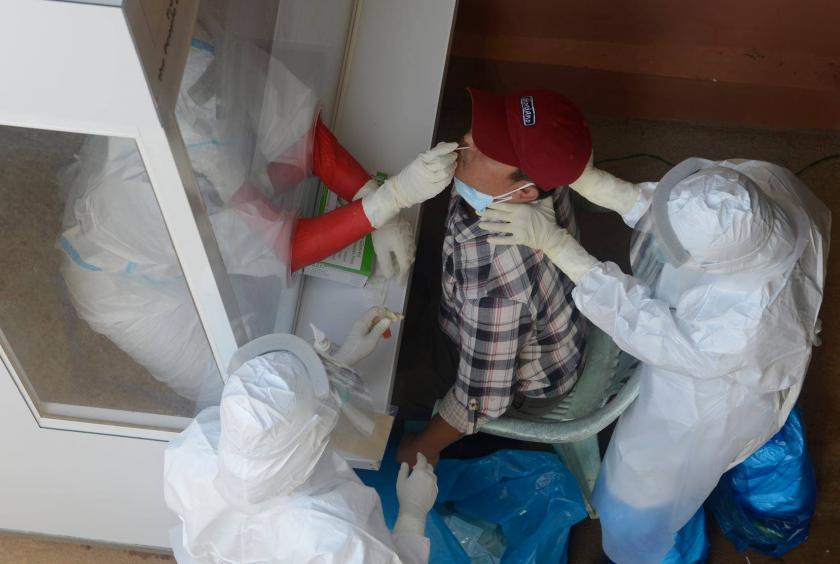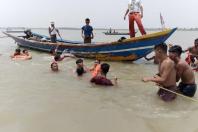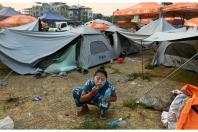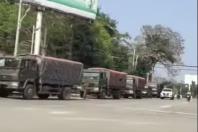"There are so many funerals that a street without one is so rare," said Kyaw Kyaw from Kale town.
In June, number of COVID-19 cases in Sagaing Region shot up noticeably.
In Tarhan Ward, the cases are too numerous for oxygen supply to keep up.
The resurgence of COVID-19 hit after three months when Myanmar is still embroiled in turmoil following political changes.
It is a great and urgent challenge for the State Administration Council.
The 3rd Wave
So far, the third wave of the pandemic had hit much harder than the second.
The Ministry of Health and Sports (MOHS) had announced its results, showing that from lab results of positive cases, there exists mutated variants of the virus.
There were two Alpha variant cases, five Delta and four Kappa, which is included amongst the list of Variants of Interest. Those variants were originally found in India, USA, France, Germany, Spain, Ireland and Switzerland.
"If you compare Alpha and Delta, Delta is 60 percent more infectious than the Alpha variant," said an official from the MOHS.
The official also confirmed that family members are more likely to be infected.
"Alpha and Delta has a special characteristic of having higher percentage of infecting family members in contact with the patient," said the official, referring to official data released by the MOHS.
The data also shows that the amount of cases spiked in June with new cases found each day breaking records of the previous.
Most notable spikes in infection rates so far were 14.67 percent on June 25th, 14.1 on 26th, 17.37 on 27th, 18.6 on 28th, 15.9 on 29th and 19.9 on the 30th. While the numbers of July 2 did not manage to top the numbers on July 1, the overall infection rate remains high with 20.4 percent. The death toll then clocked in at 3364.
"The infections started to go up around the end of May. The speed is very fast," said the MOHS official.
The home treatments
According to Kale residents, there are many within Sagaing Region that had been infected with Covid-19 but had opted to lock themselves at home to try and get better.
"Some don't bother going to the hospitals anymore. They are trying to get better at home. If rapid and thorough tests are conducted, I think the number of Covid-19 positive cases will be higher than what it is known," said a local.
Kale is a town that borders Chin State and according to locals, there are many that came over from Chin State and were infected with the virus.
"Kale is relatively large. There are many that came down from Chin State due to a myriad of reasons and most stay in town. Many of them are sick now and are shutting themselves in at homes. If they were to get tested, the numbers could be much higher," said another Kale local.
Kale saw rapidly climbing number of Covid-19 cases near to the end of June with MOHS's official data showing that there were at least 582 cases during the last week of June.
Similarly, Yangon, Mandalay and Chin states and regions have been seeing rising cases of Covid-19.
In Yangon Region, the treatment of Covid-19 patients are allowed both public and private hospitals. There are many patients across several hospitals.
The Yangon General Hospital and North Oakkalapa Hospital are reserved for those with severe symptoms and those with healthier conditions are allowed to seek treatment at respective health departments in townships, according to the MOHS.
"If it's severe, you can go to two hospitals. Otherwise, you can seek treatment at township level hospitals," said the official.
According to those that have been to and discharged from private hospitals, the minimum amount of money is at at around 2 million Kyats and may go up to double-digit millions if the patient is to be put into the ICU.
"Most people will not be able to afford it. Private hospital treatments are costly," said a person that sought treatment at a private hospital.
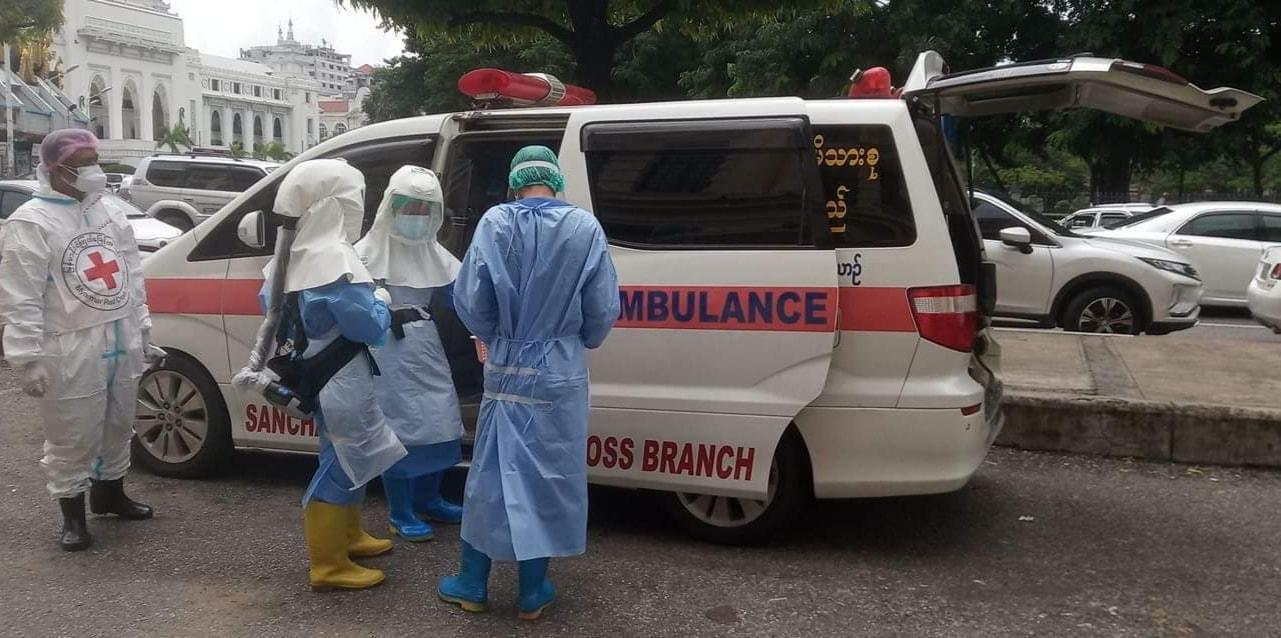
Ambulance being readied to transport Covid positive patients. (Photo - San Chaung Red Cross group)
Vaccination efforts
Out of the eight WHO approved vaccines, two are being injected in Myanmar. They are Indian-made COVISHIELD and China-made Sinopharm.
But the MOHS had spoken of difficulties obtaining vacinnes already purchased from India due to rising amount of Covid-19 cases in India.
More batches of vaccines that may possibly arrive from China totals at 300,000. This is only enough for 150,000 people.
An official from the contagious diseases department had said that vaccines are limited and Sinopharm cannot be used to innoculate every citizen.
"We are trying different means to obtain vaccines from different countries including India," said the official.
Dr Khin Khin Gyi from the MOHS had said that processes are underway to purchase 2 million doses of Sputnik, a Russia-made vaccine.
According to official data, as of May 29, there were 1.4 million people that have taken 2 doses of COVISHIELD and 1.8 million people injected only once.
The MOHS had also warned that both vaccines requiring either one or two doses will require some time in between for the vaccination to take effect. In the mean time, Covid-19 can still be contracted from those infected.
More townships under Stay-at-home order
The stay-at-home orders began at around the end of May and had only increased over time.
As of July 3, there are now 26 townships that have been placed under the stay-at-home order. In Mandalay Region, the townships under the order are Chanmyae Tharsi, Aungmyay Tharzan, Chanaye Tharzan, Pyigyin Tagon, Maha Aungmyay, Pathein Gyi, Pyin Oo Lwin and Amarapura. In Bago Region, they are Tharyawadi, Minhla, Letpadan and Phyuu.
In Chin State, there are Tonzam, Tiddim, Phalam, Htatalan and Hakha. For Sagaing Region, they are Tamu, Homalin and Kale. In Shan State, they are Lashio, Naungcho and Laukkai in Kokkang Self-Administrative Region. In Ayeyawaddy, They are Pathein, Myaungmya and Tharpaung townships.
"If people from Stay-at-home places wants to enter other states and regions, they will be checked. If they show negative results, they will be quarantined for 10 days. If they are positive then procedures are already in place for that. Those not from Stay-at-home townships will not need to quarantine. It may change depending on the situation in each respective townships and that township's covid committee," said the official from the contagious diseases department.
Those living in the stay-at-home townships, even if vaccinated, are to follow regulations and guidelines set for them by the MOHS.
The challenges of the third wave
The government will no doubt face great challenges for the third wave.
During the second wave, everything from the transport of Covid-19 patients to quarantine centers in each townships were plenty but during this time period, they will all become problems to tackle.
There still exists civil and volunteer groups in each township but their members as well as their capacity had been reduced considerably.
"There were many youths previously. We could make proper duty rosters. Too little of them nowadays," said a person from a volunteer group.
Those groups had also said that there are many little donors for the third wave as well.
"Equipment to use for transporting patients such as PPE or gloves run out too quickly. They are not reusable and so there are many problems. What we have to do now is that if had already worn PPEs, we have to transport them immediately. It wasn't like that before. We had more people then so we could split up into groups for different places," said a volunteer from Yangon Region.
There is also rising demands for oxygen, especially in Kale and Tamu in Sagaing Region where the demand and supply do not match. As of now, oxygen tanks and cannisters are being transported from places such as Yangon, Mandalay and Monywa.
"We have to order from places like Yangon and Mandalay as well as Monywa. There is only one place to refill oxygen over here. It is not enough," said a joint-secretary Par Tate from LCEC school in Kale.
An official from the MOHS had said that the oxygen demand and lacking of supply is an urgent situation and that the ministry is working to fulfil the demands.
"Oxygen is extremely important for Covid. We are working on providing more oxygen to Kale where there is an urgent need for more."
The third wave had struck and only continues to proliferate out of control across many places in Myanmar, killing increasing amounts of people.
This will be a puzzle for the government to figure how to control the spread of Covid from further running rampant.


